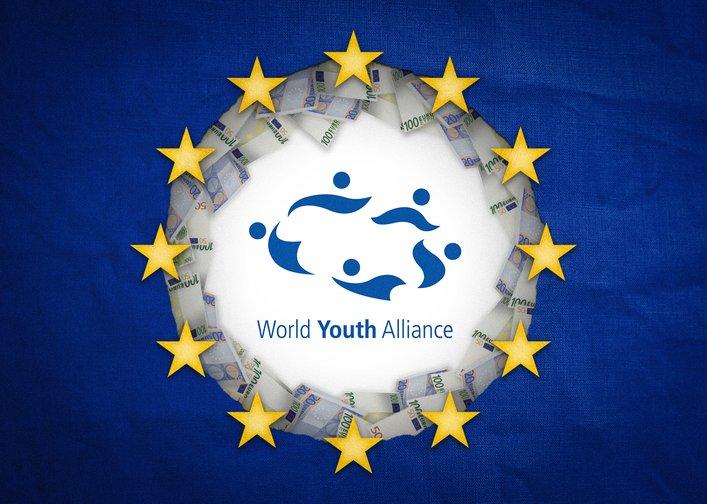The European Union has given more than a million euros to a charity that peddles anti-abortion misinformation and whose founder compared reproductive rights to the Holocaust, an investigation by openDemocracy can reveal.
The US-based World Youth Alliance (WYA) – which has a European office in Brussels – is officially a “non-religious” non-governmental organisation, yet its values and teachings often echo religious conservative talking points on gender rights.
The charity falsely states abortion can cause infertility and negatively impact subsequent pregnancies – claims rejected by the UK’s National Health Service – while its founder, Anna Halpine, has likened abortion to Europe and Africa’s worst genocides.
In a 2019 interview with a Catholic graduate school in Colorado, Halpine said: “Recall the Nazis and their campaign to dehumanise Jews, this was also a central aspect of the Rwandan genocide, which first broadcast that one group of people were ‘cockroaches’ and not persons. In our own day, we can see this very clearly with abortion.”
Such disinformation about reproductive rights can endanger women. Yet the European Union is funding the WYA to spread its false claims around the world, despite the European Parliament urging member states to accept that access to sexual and reproductive health is a human right in a 2021 vote.
The EU gave the charity €1.2m of public money via its Erasmus programme between 2010 and 2022. Data shared with openDemocracy by the European Parliamentary Forum for Sexual and Reproductive Rights (EPF) found the EU had spent €572,000 via its Erasmus scheme – while the EU confirmed to openDemocracy that WYA had received €1,278,212 as a beneficiary or coordinator across 21 programmes.
Organisations based in EU member states that are “active in the fields of education, training, youth or sport” can apply for Erasmus grants to fund internships and study abroad placements for young people in Europe. The WYA’s internships invite young people to help implement the charity’s “education, advocacy and culture” projects globally, including in the Global South.
Gillian Kane, director of policy and advocacy at the reproductive rights NGO Ipas, told openDemocracy: “It’s really difficult to square Erasmus’s commitment to academic rigour and cultural exchange with their ongoing funding of a youth organisation that peddles mis and disinformation on abortion, a safe medical procedure and basic human right.”
Research published by EPF in 2021 detailing anti-abortion activity in Europe found the WYA “tapped into EU funding by promoting its ‘Human Dignity Defenders’ training” – referring to the Human Dignity Curriculum (HDC), a sex education programme for teenagers developed by the WYA.
The curriculum claims “to promote a healthy and integrated understanding of sexuality among young people”, arguing that current sex education curricula are causing “an early sexual debut among youth” that “negatively impacts life plans by effects on health, education, earning power, and marriage”.
The Family Planning Association, a UK charity that seeks to enable people to make informed choices about sex, confirms that sex education “does not encourage children to have sex”.
WYA opposes comprehensive sex education, defined by the World Health Organisation (WHO) as accurate, age-appropriate information about sexuality and their sexual and reproductive health, arguing that such teaching is “objectionable or offensive”.
The Human Dignity Curriculum is directed by Clare Halpine, the sister of WYA’s founder. Earlier this year, Clare wrote that the Global Fund – the world’s largest financier of care programmes for AIDS, tuberculosis and malaria – supports HIV-AIDS and TB treatment in Kenya as part of an imposition of “gender theory” via “ideological colonisation”. The Christian right has long claimed that efforts to improve and invest in inclusive programmes on sexual and reproductive health and rights are a form of neo-colonialism.
As well as executing or managing projects relating to education, WYA interns are encouraged to connect with young people in Africa and Latin America, who then campaign against reproductive and sexual rights efforts in their countries.
The amount the EU has given the charity for these internships has steadily increased – rising from just under €30,000 in 2010 to €125,000 in 2022, the most recent data available. The charity has the EU logo displayed prominently on its website, stating that it is “co-funded by the European Union”. According to its 2022 annual report, WYA had a total revenue of $804,000 – meaning EU funding makes up a significant source of revenue.
“It’s a scandal that EU funding went to support such an organisation,” said Neil Datta, founder and executive director of EPF. “This means that EU taxpayer money was used to disinform women about their health and legal rights in a manner which is contradictory to EU values.”
Datta continued: “The volume and duration of the EU’s financial support to such an organisation is surprising and disappointing. The European Parliament has been very clear about the EU’s support on sexual and reproductive health and rights and it’s time the new Commission act on this commitment by stopping all EU funding to organisations which disinform women about abortion.”
International influence
WYA has also sought to influence reproductive and sexual health policies in several countries in Africa.
Apart from its youth internships, the WYA delivers training to medical professionals, university students and schoolchildren in Kenya, Ethiopia and South Africa from its office in Nairobi. This includes giving seminars on “protecting the right to life from conception”, and encouraging “a holistic approach to sex education” – euphemisms for curtailing abortion and contraceptive rights.
In 2022, the WYA campaigned to influence Kenya’s controversial Reproductive Health Policy, which puts the age of sexual autonomy at 21, promotes abstinence, and parental controls for access to sexual and reproductive health services. Kenyan pro-choice activists criticised the policy for, among other issues, obscuring the issue of unsafe abortion.
The charity’s intervention repeated false claims first made in a 2012 white paper that access to safe abortion does not reduce the maternal mortality rate. It is estimated that 22,000 women globally, including 2,600 in Kenya, die as a result of unsafe abortion annually, and the World Health Organisation is clear that providing safe abortion reduces deaths of pregnant women.
A year later, in 2023, WYA published a “declaration” on “foreign aid and coercion”, which called foreign aid a “form of ideological colonisation” that forces countries to adopt “so-called reproductive rights.” This ignores the strong pro-abortion grassroots movements in many African countries and the fact that the WYA is itself a foreign entity campaigning against abortion in the region.
The charity also promotes its period-tracking app, FEMM Health, on its social media – including on pages specifically targeting women in Africa. FEMM Health shares disinformation about hormonal contraception, which it claims is “detrimental” to a woman’s health. The NHS confirms that while “hormonal contraception can raise the risk of blood clots and breast cancer, the risk is very low”.
FEMM’s global program manager, Gabrielle Jastrebski, has further claimed that taking hormonal contraception is “the beginning of the road to abortion”. This is disputed by research published by the London School of Hygiene and Tropical Medicine, which found that “rising contraceptive use results in reduced abortion incidence in settings where fertility itself is constant”.
“Anyone who says contraception is the beginning of the road to abortion is someone who doesn't care about the lives or health of people and families,” Mara Clarke, the founder of the SAFE abortion fund, told openDemocracy.
“And what they are truly against is not abortion and contraception but non-procreative sex. Either we believe in giving people what they need to prevent sexually transmitted diseases and unintended pregnancies – or we lose all claim to caring about families and health,” Clarke continued.
As well as receiving EU funding, the WYA is backed by the region’s old aristocracy. The late German aristocrat Count of Ballestrem served on the charity’s board and founded a support association to “raise consistent financial support from private individuals in order to facilitate the ongoing work on the World Youth Alliance”. His wife, Consuelo, Countess of Ballestrem, also sat on the Board. Its patrons include Prince Nikolaus of Liechtenstein and Christoph Cardinal Schönborn, while Elisabeth Hohenberg, of a German aristocratic family, sits on its Board of Directors.
Other funding comes from US anti-abortion interests. In 2019, the Guardian reported that US charity The Chiaroscuro Foundation provided $1.7mn over three years to assist WYA’s development of the FEMM Health period tracking app. The associated FEMM Health Foundation is backed almost exclusively by Sean Fieler, a wealthy Catholic hedge-funder who has long supported organisations that oppose birth control and abortion.
In a statement, the European Commission told openDemocracy: "Ethical obligations under Erasmus+ oblige programme beneficiaries to respect the EU values of respect for human dignity, freedom, democracy, equality, the rule of law and respect for human rights when implementing activities under Erasmus+. They must also abstain from professional misconduct.
"Misconduct could involve the intentional proliferation of disinformation, causing public health harms, which undermines trust in the Erasmus + programme. If a beneficiary is in breach of the ethical obligations set out in the grant agreement, the agreement could be terminated and the funds recovered."
They confirmed that "the Commission is looking into the matter and will carry out, together with the National Agencies who selected the projects at stake, an analysis to assess whether there has been a breach of the grant agreement for non-compliance with EU values or serious professional misconduct."
WYA did not respond to a request for comment.



